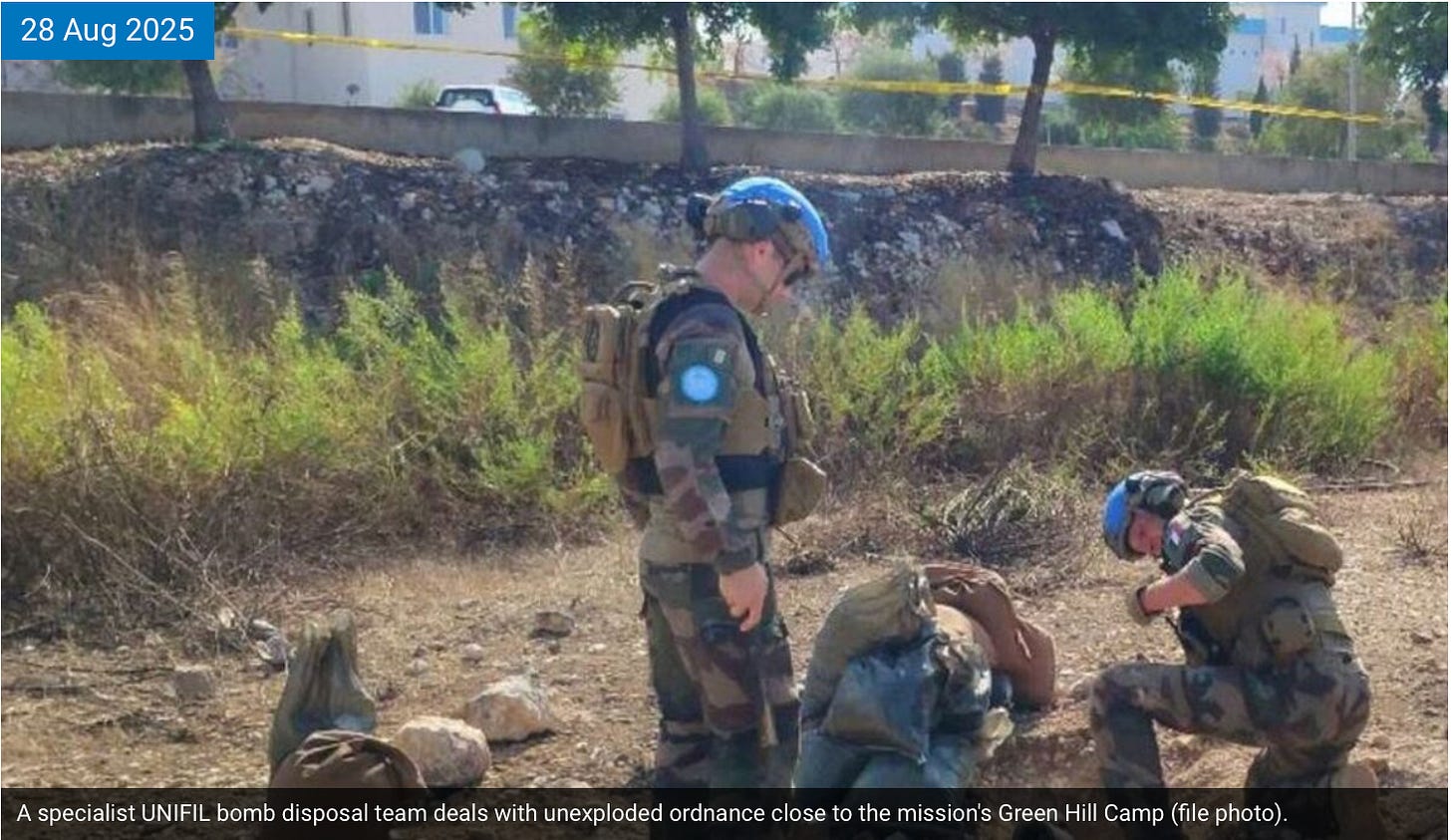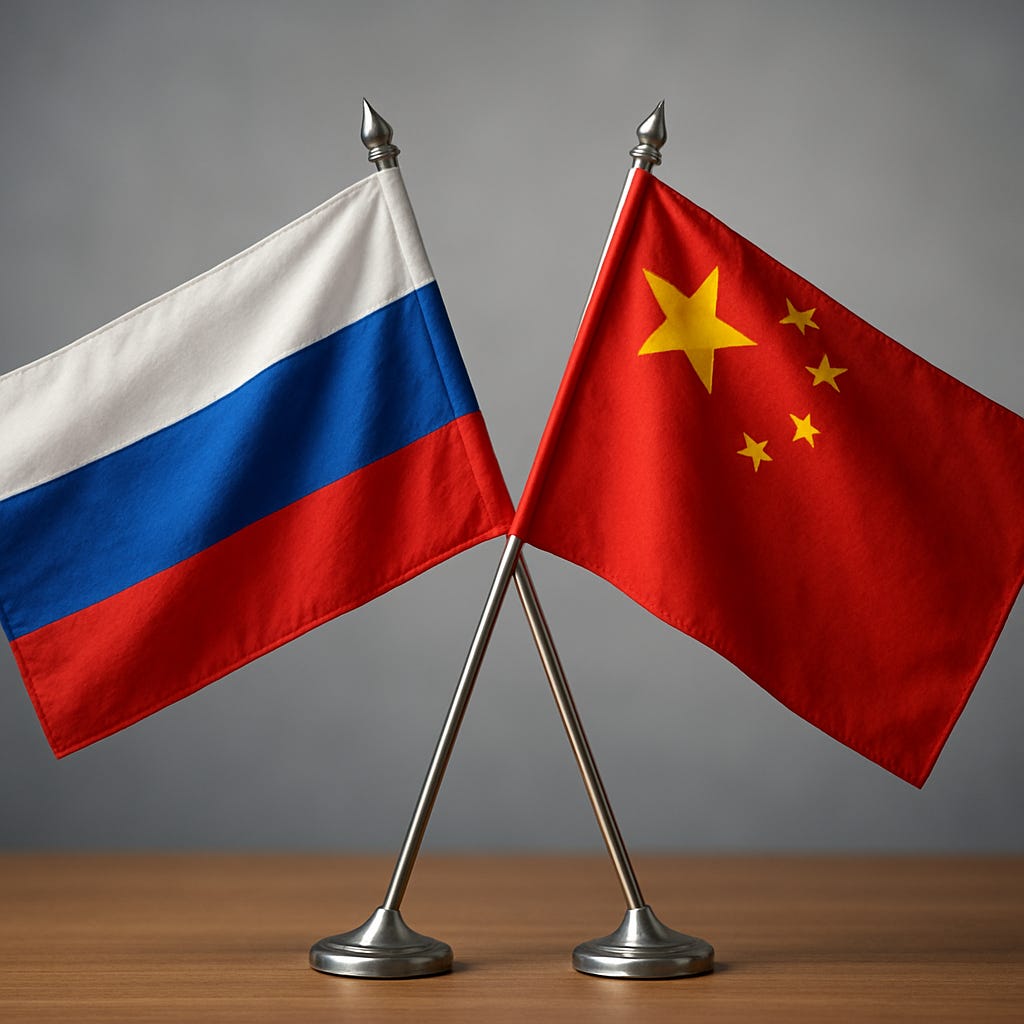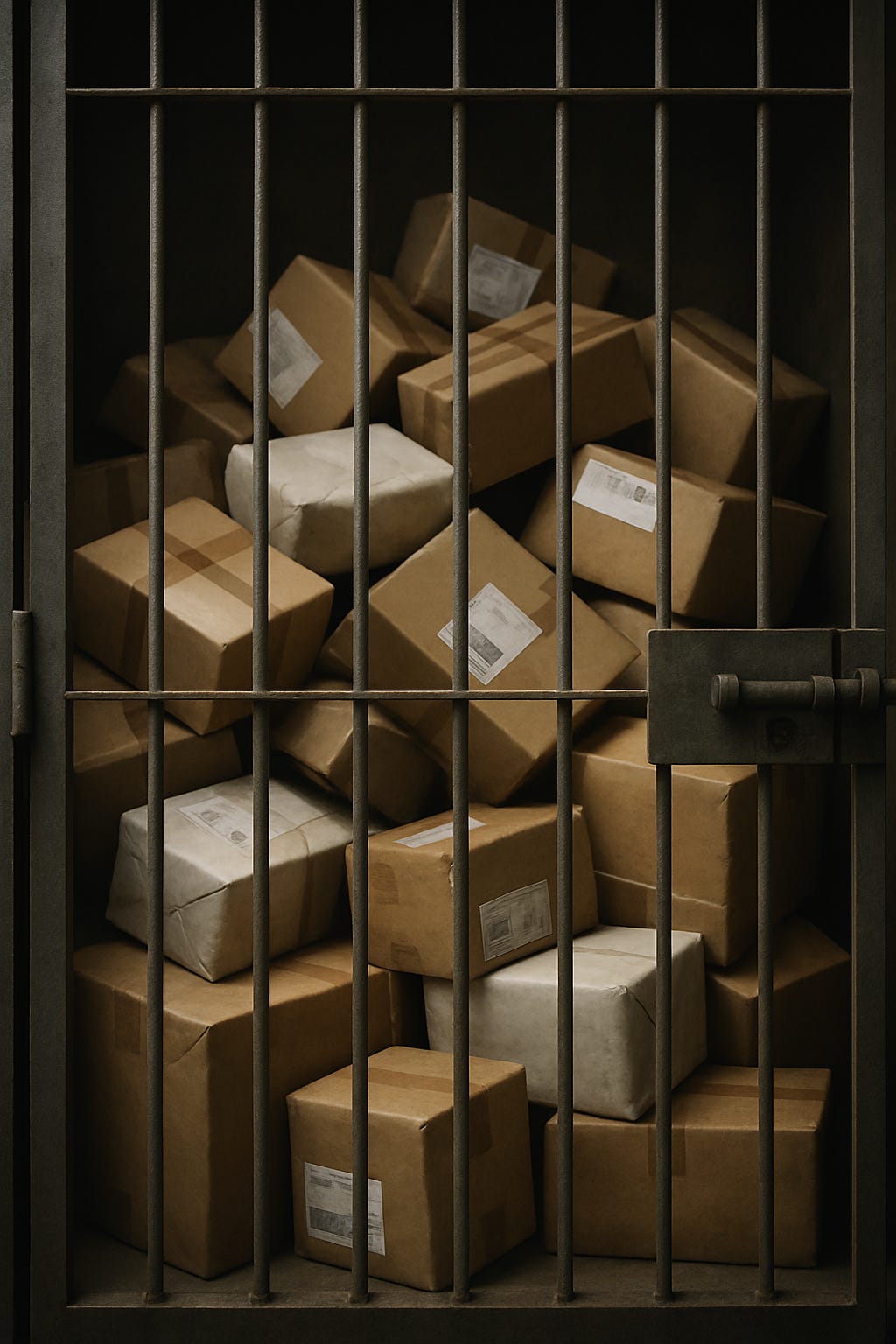10 Things Global News - 29th August 2025
The news from around the world
EU Office in Kyiv Damaged in Russian Strikes
Europe Moves to Restore UN Sanctions on Iran
US Approves $825 Million Arms Sale to Ukraine
UN Extends Lebanon Peacekeeping Mission to 2026
Putin and Xi to Meet as Trade Declines
Brawl in Mexican Senate Over US Intervention Debate
Colombia Frees 33 Soldiers After Guerrilla Standoff
Modi Heads to China Amid Tariff Dispute with US
US Ends Duty-Free Exemption on Small Imports
Ex-PM and Former First Lady Indicted in Seoul
Russia’s overnight missile and drone assault on Kyiv killed at least 17 people, including four children, and injured dozens, according to Ukrainian officials. The strikes damaged buildings across the capital, including the European Union’s delegation, though no staff were harmed. EU officials strongly condemned the attack, describing it as a deliberate escalation and violation of international conventions protecting diplomatic missions.
European Commission President Ursula von der Leyen said the Kremlin was targeting civilians and vowed new sanctions, announcing a 19th package to tighten restrictions on Russia and efforts to use profits from frozen Russian central bank assets to support Ukraine. High Representative Kaja Kallas summoned Russia’s envoy in Brussels, saying diplomatic missions should never be targets.
The barrage also hit the British Council’s offices in Kyiv, prompting the UK to summon the Russian ambassador. EU leaders pledged solidarity with Ukraine and renewed calls for Moscow to stop the violence and pursue negotiations.
Sources: Reuters, Euronews
The UK, France, and Germany have triggered the “snapback” mechanism under the 2015 nuclear deal, seeking to reinstate UN sanctions on Iran within 30 days. The decision follows Iran’s refusal to resume talks with the US or allow International Atomic Energy Agency inspectors access to nuclear sites after Israeli and US strikes in June.
The three nations, known as the E3, said Iran’s stockpile of near-weapons grade uranium and its lack of cooperation with inspectors show deliberate non-compliance with its commitments. They argue there is no civilian justification for enrichment levels far above the limits set in the 2015 accord.
Iran condemned the move as illegal and warned it could leave the Nuclear Non-Proliferation Treaty if sanctions return. Russia and China back Tehran’s position, while the US welcomed the European initiative. The UN now has 30 days to decide whether sanctions relief continues or lapses.
Sources: BBC, Bloomberg
The United States has approved a $825 million arms sale to Ukraine, including 3,350 Extended Range Attack Munition (ERAM) missiles, navigation systems, spare parts, and technical support. The State Department said the sale will strengthen Ukraine’s ability to defend itself and contribute to regional security, while also advancing U.S. national security goals.
Ukraine will finance the purchase through a mix of U.S. military aid and contributions from NATO allies Denmark, the Netherlands, and Norway. Kyiv confirmed the package, with officials stressing the importance of international support as Russia intensifies strikes on civilian targets.
The decision comes weeks after NATO allies launched the Prioritized Ukraine Requirements List, a framework allowing members to jointly procure U.S. weapons for Ukraine. The announcement follows President Donald Trump’s meeting with Vladimir Putin in Alaska, where efforts to secure a negotiated settlement to the conflict yielded no breakthrough.
Sources: Kyiv Independent, Associated Press
The UN Security Council has unanimously extended the mandate of its peacekeeping mission in Lebanon until the end of 2026, marking what it called a “final time” before beginning a year-long drawdown. The resolution, drafted by France and adopted after negotiations with the United States, instructs the UN Interim Force in Lebanon (UNIFIL) to cease operations on 31 December 2026 and begin a safe, orderly withdrawal in close consultation with Beirut.
Established in 1978, UNIFIL has long monitored the Lebanese-Israeli border and was expanded in 2006 after the war between Israel and Hezbollah. The mission has since supported the Lebanese Armed Forces in securing the south. Acting US Ambassador Dorothy Shea said Washington would not back another extension, citing a changed security environment.
The resolution allows UNIFIL to continue protecting civilians and supporting humanitarian aid during its final phase, while the Secretary-General is tasked with proposing options for a permanent peace framework.
Sources: Al Monitor, UN News
Russia’s trade with China, which reached a record $245 billion in 2024, has fallen 8.1% in the first seven months of 2025, led by a sharp drop in car imports, lower fuel sales, and weaker technology flows. President Vladimir Putin is seeking to reverse the decline as he prepares for a summit with President Xi Jinping in Tianjin during the Shanghai Cooperation Organisation meeting.
Moscow views the partnership with Beijing as essential, particularly under sanctions, but Chinese customs data shows fuel exports to China fell nearly 20% and imports of vehicles dropped 46%. Russia is now exploring agriculture and energy projects, including the delayed Power of Siberia-2 pipeline, though progress has been limited.
Xi and Putin have pledged to deepen ties since signing a “no limits” partnership in 2022, but the imbalance between their economies underscores Beijing’s dominant role. India’s presence at the summit highlights Russia’s push to revive trilateral cooperation with China and India.
Sources: Reuters, Economic Times
Mexico’s Senate descended into chaos after opposition leader Alejandro Moreno of the PRI confronted Senate president Gerardo Fernández Noroña of the ruling Morena party during a heated session on U.S. military involvement against drug cartels. Video footage showed Moreno pushing Fernández Noroña several times, slapping him on the neck, and knocking another man to the ground as other lawmakers attempted to intervene.
The confrontation followed accusations from Morena lawmakers that PRI and PAN politicians had called for U.S. military intervention, which both parties deny. Fernández Noroña said he would file a complaint against Moreno for bodily harm and request his legislative immunity be lifted, while also proposing his expulsion from the Senate. Moreno countered by accusing Fernández Noroña of starting the fight.
The clash came as President Donald Trump directed the Pentagon to use military force against Latin American drug cartels, a move Mexico has firmly rejected, insisting no foreign troops will be allowed on its territory.
Sources: CBS News, NY Post
Thirty-three Colombian soldiers held by villagers in a guerrilla-controlled Amazon region were freed Thursday after three days in captivity, authorities confirmed. The troops had been detained in Nueva York, Guaviare province, following clashes with dissident fighters who rejected the 2016 peace accord with the FARC. At least 10 to 11 guerrillas, including a commander, were killed in the fighting.
The Ombudsman’s office and the United Nations mediated the soldiers’ release, which officials described as a kidnapping. Defense Minister Pedro Sánchez said the captors initially demanded the return of a slain rebel’s body. The army has filed a complaint with prosecutors and deployed reinforcements to prevent further attacks in the volatile area.
Guaviare is a strategic corridor for drug trafficking and coca cultivation, where civilians are often pressured by armed groups. Similar detentions of troops have become common as dissidents led by warlord Iván Mordisco continue to resist state control.
Sources: France 24, Straits Times
Indian Prime Minister Narendra Modi will visit China this weekend for the Shanghai Cooperation Organisation summit, his first trip there in over seven years. He is set to meet Chinese President Xi Jinping on August 31 and Russian President Vladimir Putin on September 1, as India seeks to diversify partnerships while facing new U.S. tariffs on its exports.
The Trump administration recently doubled duties on Indian goods, raising rates to as high as 50% on textiles, steel, and farm products. Washington has cited India’s continued imports of Russian oil as justification. India, which exported $86.5 billion to the U.S. last year, has threatened WTO action and launched a new export drive targeting 40 countries.
While India’s ties with Washington are strained, relations with Beijing show signs of cautious improvement after the 2020 border clashes. Modi’s meetings with Xi and Putin are expected to focus on trade, investment, and balancing global alignments.
Sources: The Guardian, India Today
The United States has ended its “de minimis” tariff exemption, which allowed duty-free entry of imports valued under $800. Starting Friday, millions of small packages will now face customs duties, tighter checks, and higher costs.
The exemption, first introduced in 1938 and expanded over time, was key to the rise of low-cost e-commerce giants like Shein and Temu. In 2024, nearly 1.4 billion parcels worth $64 billion entered the U.S. under the rule. President Donald Trump accelerated its repeal, citing the need to protect U.S. businesses, curb smuggling of narcotics and counterfeit goods, and raise $10 billion annually in tariff revenue.
The change has already led dozens of foreign postal services, including from Europe, Asia, and Latin America, to suspend shipments to the U.S. Consumers and small businesses are expected to face higher prices, shipping delays, and fewer product choices as companies adapt to the new regime.
Sources: BBC, Axios
South Korean prosecutors indicted former Prime Minister Han Duck-soo and Kim Keon Hee, wife of ousted president Yoon Suk Yeol, on Friday in cases tied to Yoon’s short-lived martial law declaration and corruption allegations.
Han faces charges of abetting Yoon’s attempt to impose martial law in December 2024, which prosecutors say amounted to rebellion. He is also accused of falsifying documents and perjury. The martial law bid, which collapsed within hours, triggered Yoon’s impeachment and removal from office in April.
Kim Keon Hee was indicted on financial and bribery charges, including providing funds for stock manipulation, receiving free opinion polls ahead of the 2022 election, and allegedly taking luxury gifts from the Unification Church in exchange for favors. Both deny wrongdoing.
The indictments mark the first time a former presidential couple in South Korea face simultaneous criminal prosecution, extending a history of political leaders ending their tenures amid scandal.















